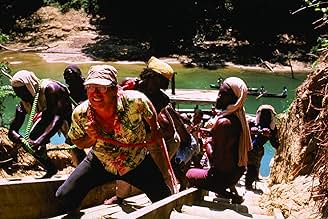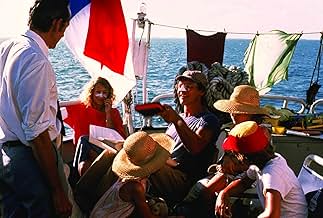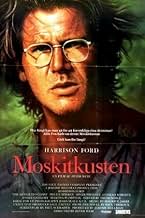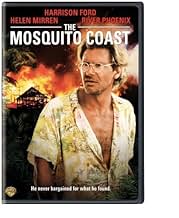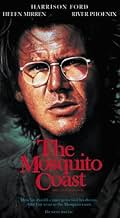AVALIAÇÃO DA IMDb
6,6/10
33 mil
SUA AVALIAÇÃO
Um inventor rejeita sua vida urbana e muda-se com sua família para as selvas da América Central para viver uma utopia.Um inventor rejeita sua vida urbana e muda-se com sua família para as selvas da América Central para viver uma utopia.Um inventor rejeita sua vida urbana e muda-se com sua família para as selvas da América Central para viver uma utopia.
- Prêmios
- 1 vitória e 3 indicações no total
Alice Heffernan-Sneed
- Mrs. Polski
- (as Alice Sneed)
- Direção
- Roteiristas
- Elenco e equipe completos
- Produção, bilheteria e muito mais no IMDbPro
Avaliações em destaque
I can almost guarantee that anyone who has seen 'The Mosquito Coast', then looked at the subject line of this review, thinks I'm crazy. The truth is that this film is deeply flawed and undeniably weak in many regards, but it had a quality I cannot describe. This is the only film I have ever seen that, despite many shortcomings, manages to come out of the storm relatively unscathed, and become an unforgettable, almost haunting, movie.
The production values are immaculate. Peter Weir's direction is excellent, and is in top form here. He has crafted a thick shell that blocks the flaws from coming up to the surface, an indescribable feat that very few directors have accomplished. The musical score is good, not outstanding, but it's fitting, and surprisingly subtle. There is only about six minutes out of the entire film that has musical accompaniment, which makes for a very unique experience, and not necessarily a bad one. The tropical cinematography is dazzling, and the decision to shoot on location in Belize instead of on a studio back lot really paid off, contributing greatly to the film's success.
As good as the mentioned characteristics are, nothing is as good as the acting, especially that from the two leads: Harrison Ford and River Phoenix. Prior to this, Ford had made a name for himself with big budget action roles, with several failed attempts at drama (Hanover Street being the best example of that). It wasn't until 1985's 'Witness' (which Peter Weir also directed, that Ford was taken seriously as an all around actor. Personally I think Ford's performance here greatly overshadowed his work in 'Witness', and is a career best for him, even in the light of 'Regarding Henry' and 'Presumed Innocent', both made after his. He takes the character of Allie Fox, and moulds him into a selfish, driving maniac, blind to the wishes of others, only caring for himself. Phoenix, on the other hand, deserves even more acclaim, for several reasons. For one, this was only his third film, after 1985's 'Explorers', and 'Stand by Me', made right before this. Secondly, he was only 15 at the time of the shoot, and had little acting experience, yet he easily out acted most of his co-stars. Though his performance wasn't quite as refined as Ford's was, he still reached a level of near perfection and set the stage for a glorious, and ultimately tragic, career.
The story is one of utter genius, one of the few original ones popping up in an industry full of sequels, remakes and rip offs. Based on the 1981 bestseller by Paul Theroux, and co-starring Helen Mirren, 'The Mosquito Coast' deserves a place among the best films of the 80's.
But wait, I'm not done. Despite a great exterior, deep inside the movie is troubled. It's as if director Weir pushed all the movie's problems deep down under the surface, then piled layer after layer of... something, on top of it, hiding them from the clueless audience. My main problem with the movie is that it yearns to break away from it's literary roots, a problem that could've been easily avoided had the right script come along. Entire conversations are lifted from the text, and there isn't a single line that doesn't have an equal counterpart in the novel. For me this got extremely tedious as, hours before popping in the tape for a second viewing, I had finished the book, and the two are much too similar.
Another problem I have with it is that the scenes are much too short, with none of them running over about a minute and a half. An obvious result of this is that many subplots remain unresolved, and several concepts are hinted at, but go without further explanation, making for a confusing story. If the screenwriter had put a little more effort into making the film different than the book, with new scenes, we would have seen a much better end product.
A third, albeit a smaller one, is that the production team apparently spent too much time making sure that the movie would get a PG rating, though it would've been much better had it gotten an R, or even a PG-13 rating. That would've allowed Ford a little more breathing room to tweak his character, possibly allowing Allie to become less sympathetic, more of a madman.
I can't think of much more worth saying to put in this review, so I'll end it with this note: see the movie, even if you've read the book, but don't do the two back to back.
The production values are immaculate. Peter Weir's direction is excellent, and is in top form here. He has crafted a thick shell that blocks the flaws from coming up to the surface, an indescribable feat that very few directors have accomplished. The musical score is good, not outstanding, but it's fitting, and surprisingly subtle. There is only about six minutes out of the entire film that has musical accompaniment, which makes for a very unique experience, and not necessarily a bad one. The tropical cinematography is dazzling, and the decision to shoot on location in Belize instead of on a studio back lot really paid off, contributing greatly to the film's success.
As good as the mentioned characteristics are, nothing is as good as the acting, especially that from the two leads: Harrison Ford and River Phoenix. Prior to this, Ford had made a name for himself with big budget action roles, with several failed attempts at drama (Hanover Street being the best example of that). It wasn't until 1985's 'Witness' (which Peter Weir also directed, that Ford was taken seriously as an all around actor. Personally I think Ford's performance here greatly overshadowed his work in 'Witness', and is a career best for him, even in the light of 'Regarding Henry' and 'Presumed Innocent', both made after his. He takes the character of Allie Fox, and moulds him into a selfish, driving maniac, blind to the wishes of others, only caring for himself. Phoenix, on the other hand, deserves even more acclaim, for several reasons. For one, this was only his third film, after 1985's 'Explorers', and 'Stand by Me', made right before this. Secondly, he was only 15 at the time of the shoot, and had little acting experience, yet he easily out acted most of his co-stars. Though his performance wasn't quite as refined as Ford's was, he still reached a level of near perfection and set the stage for a glorious, and ultimately tragic, career.
The story is one of utter genius, one of the few original ones popping up in an industry full of sequels, remakes and rip offs. Based on the 1981 bestseller by Paul Theroux, and co-starring Helen Mirren, 'The Mosquito Coast' deserves a place among the best films of the 80's.
But wait, I'm not done. Despite a great exterior, deep inside the movie is troubled. It's as if director Weir pushed all the movie's problems deep down under the surface, then piled layer after layer of... something, on top of it, hiding them from the clueless audience. My main problem with the movie is that it yearns to break away from it's literary roots, a problem that could've been easily avoided had the right script come along. Entire conversations are lifted from the text, and there isn't a single line that doesn't have an equal counterpart in the novel. For me this got extremely tedious as, hours before popping in the tape for a second viewing, I had finished the book, and the two are much too similar.
Another problem I have with it is that the scenes are much too short, with none of them running over about a minute and a half. An obvious result of this is that many subplots remain unresolved, and several concepts are hinted at, but go without further explanation, making for a confusing story. If the screenwriter had put a little more effort into making the film different than the book, with new scenes, we would have seen a much better end product.
A third, albeit a smaller one, is that the production team apparently spent too much time making sure that the movie would get a PG rating, though it would've been much better had it gotten an R, or even a PG-13 rating. That would've allowed Ford a little more breathing room to tweak his character, possibly allowing Allie to become less sympathetic, more of a madman.
I can't think of much more worth saying to put in this review, so I'll end it with this note: see the movie, even if you've read the book, but don't do the two back to back.
With much of Harrison Ford's career during the eighties dominated by his participation in George Lucas and Spielberg blockbusters, it comes as a relief to discover that in between his numerous flights on the Milennium Falcon and slashing his whip he found time to star in many low key movies. Among these hidden treasures is The Mosquito Coast, a character driven story about one mans attempt to recreate an Eden in a faraway land. And his secret to survival? Ice.
This is an interesting movie, not only because it has an all star cast, that includes River Phoenix, but because we see Harrison Ford give his all to creating a character that is multi dimensional. He is an idealist and has the best intentions, yet is doomed to failure as the viewer senses an impeding violent side to his vision which will come to destroy him.
As a movie this is a good study of man's attempt to act upon his dreams, as a lighthearted pop corn flick this will annoy the average mainstream cinema goer. Simply put, many people will find it hard to imagine Harrison Ford as anything else other than the super hero incarnation of Indiana Jones, and multi faceted anti heroes that never see the errors of their ways is a genre of cinema that Hollywood hasn't quite got their head around yet.
For everybody else who would like to see a movie that has depth, great acting and a solid script, this will be excellent viewing.
This is an interesting movie, not only because it has an all star cast, that includes River Phoenix, but because we see Harrison Ford give his all to creating a character that is multi dimensional. He is an idealist and has the best intentions, yet is doomed to failure as the viewer senses an impeding violent side to his vision which will come to destroy him.
As a movie this is a good study of man's attempt to act upon his dreams, as a lighthearted pop corn flick this will annoy the average mainstream cinema goer. Simply put, many people will find it hard to imagine Harrison Ford as anything else other than the super hero incarnation of Indiana Jones, and multi faceted anti heroes that never see the errors of their ways is a genre of cinema that Hollywood hasn't quite got their head around yet.
For everybody else who would like to see a movie that has depth, great acting and a solid script, this will be excellent viewing.
The Mosquito Coast is a movie that has many things going for it, but fails to combine all its excellent ingredients in a way that makes it feel great. I think there's still a good deal to like, but overall, it feels a bit unsatisfying and disappointing.
You have an interesting premise, with a deranged father leading his family to live in the wilderness. You have Harrison Ford playing one of the most villainous characters he's ever played (maybe the most villainous?) You have a great supporting cast with people like Helen Mirren and River Phoenix. You've got a fantastic composer in Maurice Jarre. And then there's Peter Weird directing, who's made several classics, often involving themes of isolation or "adventures" that go wrong or people getting by in unfamiliar situations.
At the end... it's fine? It never really hits that point where it becomes something else, though. Maybe it's Ford's character- while I found it a breath of fresh air for the protagonist to have few, if any, redeeming qualities, maybe that hurt my engagement with the film in the long run.
Anyway, good premise, good acting, good music, and the the way it's shot is solid, too. Maybe it just needed a tighter script to keep things more interesting, or at least more consistent. It does feel poorly adapted into a movie, screenplay-wise. You can tell these lines are from a novel, with much of the dialogue sounding like they're just reading off a page.
You have an interesting premise, with a deranged father leading his family to live in the wilderness. You have Harrison Ford playing one of the most villainous characters he's ever played (maybe the most villainous?) You have a great supporting cast with people like Helen Mirren and River Phoenix. You've got a fantastic composer in Maurice Jarre. And then there's Peter Weird directing, who's made several classics, often involving themes of isolation or "adventures" that go wrong or people getting by in unfamiliar situations.
At the end... it's fine? It never really hits that point where it becomes something else, though. Maybe it's Ford's character- while I found it a breath of fresh air for the protagonist to have few, if any, redeeming qualities, maybe that hurt my engagement with the film in the long run.
Anyway, good premise, good acting, good music, and the the way it's shot is solid, too. Maybe it just needed a tighter script to keep things more interesting, or at least more consistent. It does feel poorly adapted into a movie, screenplay-wise. You can tell these lines are from a novel, with much of the dialogue sounding like they're just reading off a page.
Frothing at the mouth with disgust for his homeland America, inventor Allie Fox (Harrison Ford), with family in tow, pulls up roots, and moves to Central America. Here, he proceeds to build a new life in the jungle, using his mechanical skills, his inventiveness, and in particular his patented machine, which produces ice, sans electricity. "Ice is civilization", he proclaims with unctuous authority. That will be the foundation for his utopian dream. But Allie is so headstrong, so convinced of his infallibility that his vision blinds him to reality. And the film's ending is poignant.
Delusion and self-deception breed nightmarish outcomes. And the cinema, through the years, has dramatized these themes quite well, in films like "Aguirre: The Wrath Of God", "Fitzcaraldo", and "Deliverance". In real life, delusion and self-deception were the basis for the events surrounding American preacher Jim Jones who, in the late 1970s, relocated his naive flock to the jungles of Guyana, whereupon he established Jonestown, envisioned as a religious utopia. The result was tragic.
Beyond the deep themes thus expressed in the script, "The Mosquito Coast" looks good visually. The tropical scenery is spectacular. Production design and cinematography are terrific. And the film's score, by Maurice Jarre, is wonderfully exotic and majestic.
My only complaint is the character of Allie Fox, who at some point badmouths just about everyone and everything. I could have wished for a quieter, less loquacious, madman. Then too, Harrison Ford plays Fox in a way that overrides subtext. In short, Fox not only is delusional and self-deceptive, he's also preachy, domineering, and totally lacking in compassion for others, someone whom we as viewers cannot root for or have any empathy with.
"The Mosquito Coast" reminds us that the grass is not always greener on the other side of the fence. Chasing that elusive pot of gold at the end of the rainbow is for dreamers. This is a good film to watch when you're facing a pile of problems. You could be like Allie's family, trying to forge some existence in the jungles and listening to the rants of an icy madman.
Delusion and self-deception breed nightmarish outcomes. And the cinema, through the years, has dramatized these themes quite well, in films like "Aguirre: The Wrath Of God", "Fitzcaraldo", and "Deliverance". In real life, delusion and self-deception were the basis for the events surrounding American preacher Jim Jones who, in the late 1970s, relocated his naive flock to the jungles of Guyana, whereupon he established Jonestown, envisioned as a religious utopia. The result was tragic.
Beyond the deep themes thus expressed in the script, "The Mosquito Coast" looks good visually. The tropical scenery is spectacular. Production design and cinematography are terrific. And the film's score, by Maurice Jarre, is wonderfully exotic and majestic.
My only complaint is the character of Allie Fox, who at some point badmouths just about everyone and everything. I could have wished for a quieter, less loquacious, madman. Then too, Harrison Ford plays Fox in a way that overrides subtext. In short, Fox not only is delusional and self-deceptive, he's also preachy, domineering, and totally lacking in compassion for others, someone whom we as viewers cannot root for or have any empathy with.
"The Mosquito Coast" reminds us that the grass is not always greener on the other side of the fence. Chasing that elusive pot of gold at the end of the rainbow is for dreamers. This is a good film to watch when you're facing a pile of problems. You could be like Allie's family, trying to forge some existence in the jungles and listening to the rants of an icy madman.
Some of the other reviews summarize this pretty well. The Mosquito Coast details flawlessly the grotesque decomposition of a good and true man. Harrison Ford's Allie is driven insane by his own intelligence and inability to control his ego. Even more remarkable and disquieting is the fact that this is based on a true story. In some ways, Allie reminds me of Dr. Mobius from Forbidden Planet. But the demons Allie conjures up are far more grotesque and deadly than anything from even Mobius' warped imagination. I conclude that this is a true piece of art and science -- magnificently crafted from beginning to end -- and I will NEVER voluntarily watch it again.
The Life and Times of Harrison Ford
The Life and Times of Harrison Ford
Take a look back at Harrison Ford's movie career in photos.
Você sabia?
- CuriosidadesWhile building the town set in Belize, the crew unearthed an ancient Mayan temple. It notified the Belize government, which declared the site an important historical find.
- Erros de gravaçãoThe "Ice from Fire" technique for using heat, ammonia and hydrogen was actually invented in 1824 by the English scientist Michael Faraday.
- Citações
Emily Spellgood: [to Charlie] I think about you when I go to the bathroom.
- Trilhas sonorasClap Your Hands
Words and Music by Gary Johnson
Performed by Grace Gospel Primary School Choir
Principais escolhas
Faça login para avaliar e ver a lista de recomendações personalizadas
- How long is The Mosquito Coast?Fornecido pela Alexa
Detalhes
- Data de lançamento
- País de origem
- Idiomas
- Também conhecido como
- La costa de los mosquitos
- Locações de filme
- Empresas de produção
- Consulte mais créditos da empresa na IMDbPro
Bilheteria
- Orçamento
- US$ 25.000.000 (estimativa)
- Faturamento bruto nos EUA e Canadá
- US$ 14.302.779
- Fim de semana de estreia nos EUA e Canadá
- US$ 110.313
- 30 de nov. de 1986
- Faturamento bruto mundial
- US$ 14.302.779
- Tempo de duração1 hora 57 minutos
- Cor
- Mixagem de som
- Proporção
- 1.85 : 1
Contribua para esta página
Sugerir uma alteração ou adicionar conteúdo ausente

Principal brecha
By what name was A Costa do Mosquito (1986) officially released in India in English?
Responda



